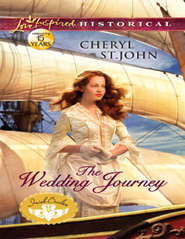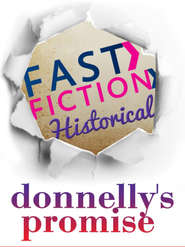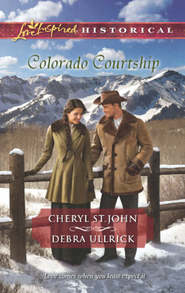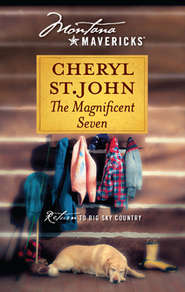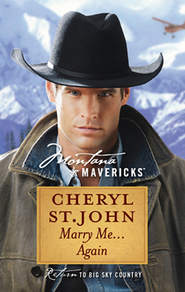По всем вопросам обращайтесь на: info@litportal.ru
(©) 2003-2025.
✖
Want Ad Wedding
Настройки чтения
Размер шрифта
Высота строк
Поля
“Yes,” she agreed. “But I’m concerned for my baby.”
“Of course you are.”
“No. What I mean is, I’ve lost two babies before it was time for them to be born.”
“I’m real sorry to hear that, ma’am. Would you like me to check your health now?” he asked. “How did you fare on your trip?”
He did a routine exam, asking questions about the circumstances leading to previous issues and finding her healthy. “I see nothing that would warn us of a problem,” he said.
“This time feels different,” she said. “I don’t know how to explain it, except I don’t feel the same way I did the other times.”
“I trust your intuition, but I caution you to get plenty of rest and not overtax your body.”
“That’s my plan,” she assured him. “I don’t want anything to happen this time.”
“I think you should come see me every few weeks,” he suggested. “We’ll keep a close watch.”
“Thank you, Doctor Fletcher.”
“Now head back to your room and rest.” He grinned. “Doctor’s orders.”
Leah said a silent prayer of thanks. This time was going to be different. This time she would have a child to hold in her arms and love. Her heart ached with the joy of gain and the sorrow of loss. One crucial component remained—the reason she’d come to Cowboy Creek. She still had to find a father for this baby—a husband.
Chapter Four (#ulink_4c454352-0175-52fe-9440-ee990e00611a)
Daniel and Will had spent the night at Noah’s and lit out at first light. Daniel gathered clothing and headed for the bathhouse, then around the corner to the barber for a shave. He met Will and Reverend Taggart outside the boardinghouse and couldn’t resist glancing up at the room where Aunt Mae had mentioned Leah was staying. He’d lain awake most of the night, and it hadn’t been the other men’s snores that had disturbed his sleep. It had been thoughts of Leah and how she would react to what he was going to ask this morning.
The reverend was appreciative of the white frame church building on Second Street, with its steeple and fresh paint. The interior smelled of new wood and plaster. The council had voted for and commissioned twelve stained glass windows that lined the east and west walls, six on each side. The morning light streamed through those windows and reflected colorful rainbows on the polished wood pews and floor.
Reverend Taggart walked up the middle aisle in devout silence, examining every beam and board of the interior as he slowly reached the front. His steel-gray eyes were moist when he turned to face the other men. “God is so good and merciful. This is more than I ever expected. I know our Creator can use this building, and I pray He can use me to minister to the people of this community. I wish my wife could have been here to see this.”
“When did you lose her?” Will asked.
“Five years ago. It’s been only Hannah and me since then.”
“Let’s go have a look at your house,” Daniel suggested.
Virgil Taggart nodded. “I can’t wait to come back here.”
Daniel dropped two keys into his hand. “It’s yours and God’s.”
The parsonage had a front porch and a yard large enough for a garden. Daniel settled his hat back on his head. “There are three bedrooms, a kitchen and small dining room. The workers are finishing up the plaster and paint this week. They’re digging a root cellar. You’ll share a well with the church. For now we’ve planned for your meals at the hotel, but I hope to hire a cook and housekeeper for you.”
“I’m a simple man, Mr. Gardner. Hannah and I have been on our own for some time. Once she’s married I can look after myself.”
“You can, but your time is better spent looking after the people,” Will said.
“You should be able to move in at the end of the week,” Daniel explained. “Monday at the latest.”
“That will be fine. The boardinghouse is perfectly comfortable until then.”
They parted in front of the parsonage, and Daniel headed up Eden Street toward Aunt Mae’s. Removing his hat, he held it against the front of his coat. He took a deep breath and rang the bell. Pippa answered the door.
“Mr. Gardner! It’s so nice to see you.” She wore another fancy dress, this one in green with puffy sleeves at the shoulders. Beads at her throat and dangling earrings glistened in the sunlight that filtered through the window on the landing above. “Aunt Mae is making a pot of tea. Would you like to join us?”
“Thank you, but I’ve come to see Mrs. Swann.”
“Oh, of course. She’s upstairs. I’ll run up and get her for you.”
A few minutes later, Pippa descended the stairs. “She’ll be right down.”
He waited impatiently, pacing the foyer. Each time he came up to the framed mirror, he looked at his intense reflection and reminded himself to relax his features and smile. It wouldn’t do to scare the poor woman away.
A stair squeaked. “Daniel.”
He glanced toward the landing. The light caressed her hair through the panes of glass and turned it to spun sunshine. She wore a white dress with sprigs of tiny blue flowers and light blue trim. Ivory lace stood up around her throat. Blue fabric buttons on the jacket matched another row of buttons on a flounce that covered the hoop skirt. She reminded him of a fresh floral breeze on a spring day.
“This is a nice surprise,” she said with a soft smile. “I thought you’d be busy working.”
“There’s something I want to show you.”
“Oh. Well, all right.”
“We won’t be long. You won’t need anything. Are you up for a short walk?”
“Yes, of course. That sounds nice. How far?” She came down the rest of the steps and he held open the front door for her.
“Only a block to the east.”
“I’m intrigued.”
Leah was delighted to see her friend. He offered his arm and she tucked her hand into the crook of his elbow. Daniel looked dashing in his gray jacket and black tie. His polished black boots sounded on the boardwalk that ran in front of the businesses on Eden Street, around the corner and down two steps. The side street had only a dirt path for walking, and she was thankful it wasn’t muddy.
Across the street was a saddle shop. A minute later, the sound of a hammer ringing drew her attention. A square building was under construction on the street behind the boardinghouse.
“That will be the schoolhouse soon,” Daniel told her.
They reached the corner of the block, and across the street from them on the opposite corner sat a large gray three-story house, trimmed in white, with arches above the windows, two chimneys and trees no taller than the first floor planted at intervals in the yard. “What a beautiful home.”
“It’s Second Empire architecture,” he said. “And the porch is colonial, but together it has a Victorian look without being frilly, don’t you think?”
She nodded. “I guess so. I don’t know much about architecture.”
“I saw this style used in Boston, so I studied it. The style evolved from seventeenth-century Renaissance buildings. The house has eleven rooms.”
He led her across the street and toward the house.
“Do you know the people who live here?” she asked.






